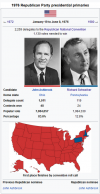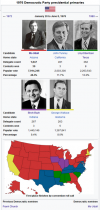View attachment 775060
States in yellow elected a majority or plurality of Republican MPs, states in blue elected a majority or plurality of Democratic MPs, states in green elected a majority or plurality of Populist MPs, states in purple elected an equal amount of Democratic and Republican MPs, states in light green elected an equal amount of Republican and Populist MPs, and states in dark green elected an equal amount of Democratic and Populist MPs.
The 1895 United States federal election was held on August 25, 1895. The government of Prime Minister John M. Palmer sought a third term in office.
In office since 1885, the government of John Palmer had proven itself reasonable popular during its first eight years, instituting policies of lower tariffs and lesser interventions in the South. During this time, meanwhile, the Republican Party had been badly split between its moderate and radical factions; during the early Palmer years, the moderate faction, led by Leader of the Opposition George F. Edmunds, had the edge, but led the party to a catastrophic result in the 1890 election, leading to William McKinley become the new Republican leader in the wake of that election.
However, in the years since Palmer had first taken office economic issues had changed greatly. The Panic of 1890 had nearly cost Palmer his majority in that year's election, with only Republican disunity preserving it, and yet, as would soon be clear, was only the prelude of further economic woes. Meanwhile, a debate had raged on the issue of gold versus silver backed currency, but initially did not translate into electoral relevance due to both major parties' leadership being staunchly on the side of sound money. This was briefly changed in 1882, when the Greenback Party won 12 seats in that year's elections, but the party failed to have relevance in Parliament and lost all of its seats in the subsequent 1885 election. However, the issue of silver remained, and was channeled into the creation of a new party into which the Greenbacks merged: the Populist Party, formed in 1889 and successful in winning 61 seats in the 1890 election - the most of any third party up to that point - and nearly denying Palmer his majority. This was, of course, all further upended by the Panic of 1893, which, even after a massive Cabinet reshuffle, completely shredded any approval left for Palmer's government. Meanwhile, the issue of alcohol prohibition bubbled under the surface, with the Prohibition Party consistently taking about 1-2% of the vote since the late 1870's, though it had up to that point failed to ever win any seats.
In the resulting election, with the Republicans renewed, Palmer faltering, the Populists surging, and Prohibition support increasing, it was unsurprising when the Democrats lost a staggering 72 seats, while all other parties gained. McKinley's Republicans surged to first place, taking 290 seats and 42% of the vote; the Populists, led once again by James B. Weaver took 84 seats and nearly 20% of the popular vote; and the Prohibitionists, led by John St. John of Kansas, took 5% of the vote and 14 seats.
Once the votes were tallied and the seats distributed, it soon became clear there was no clear majority. Though coalitions had occurred before, with the Democratic-Liberal Republican coalition of 1874 and the Republican-Readjuster coalition of 1882, the Populists weren't a clear fit for either major party, with its defining issue, silver coinage, being disdained by both party leaderships. It seemed, initially, like new elections were likely to be held in early 1896, in order to resolve the hung Parliament, but then Henry Teller, a Republican MP from Colorado, announced he would challenge McKinley for the Republican leadership and attempt to forge a coalition with the Populists. Teller failed, given that silver Republicans were hard to find outside the West, but it did inspire those on the other side of the aisle, where the two panics had destroyed Palmer's control over the party, not helped by his past as a Liberal Republican and, before that, a Republican. As such, Palmer soon found himself facing a leadership challenge, with Richard P. Bland of Missouri coalescing the much larger silverite faction of the Democrats. Despite this, the gold Democrats maintained a numerical edge over the silverites, and Palmer might have kept the leadership, had it not been for current Treasury Secretary and former prime minister John G. Carlisle throwing his hat in the ring, dividing the gold Democrats. With the faction divided and in any case blamed for the party's woes, the fence sitters ended up breaking for Bland, and Palmer was overthrown from Democratic leadership, though he maintained his job of caretaker prime minister.
With Bland the new Democratic leader, the next step were the Populists. They themselves had no clear preference, and had cooperated with both parties on the state level, though this did show a clear regional difference, as Western Populists had generally participated in Democratic-Populist coalitions (seen in Wyoming, Nebraska, Kansas, and the Dakotas) while Southern Populists had generally done so in Republican-Populist coalitions (seen in North Carolina, Tennessee, Georgia, and Alabama). Ultimately, however, with Bland, a known champion of the silver cause, as Democratic leader, many Populists saw an opportunity to implement their signature policy proposal, and accepted to negotiate a coalition. It seemed like an electoral do-over would be avoided.
This was soon thrown into disarray, however, because of Prime Minister Palmer. Unhappy over the manner he as ousted from his job, staunchly opposed to any abolition of the gold standard, and never particularly beholden to his party affiliation, Palmer bolted the party and founded the National Democratic Party, which mostly copied the Democratic platform of low tariffs and states' rights, but with a decided endorsement of hard money and the gold standard. Most gold Democrats naturally chose to keep the larger party's affiliation, but among the fiercest supporters of gold over silver, Palmer made some inroads, winning over some 38 Democrats to his party. This was a massive coup that would be enough to deny a Democratic-Populist coalition a majority, and it seemed like, once again, fresh elections would be needed.
The pro-silver coalition would be saved by Henry Teller, who led a contingent of Western silver Republicans to bolt from the GOP, in hopes of, if not entering a coalition, then at least offering confidence and supply to the prospective Democratic-Populist coalition and therefore allowing it to institute free silver. Thus was the Silver Republican Party born. As it was, however, they fell short of providing sufficient seats for this scheme to work, cobbling 11 of the 18 necessary. Further involved were the Prohibition Party, whose
raison d'être many Populists were sympathetic to, offering its own 14 seats for confidence and supply, though the silverite coalition refused to promise to enact alcohol prohibition and thus, the Prohibitionists would not fully join the coalition. However, those were the votes. Bland, with the support of 224 Democrats, 84 Populists, and 11 Silver Republicans had 319 votes, against 279 for McKinley and 38 for Palmer, with the 14 prohibitionists abstaining. That was just enough, and the prohibitionists offered confidence supply. Richard P. Bland would be inaugurated as Prime Minister. Free silver seemed inevitable.
However, this quickly began to fall apart. Despite their support being crucial, the wishes of the Silver Republicans were often ignored by the Silver coalition. The budget of 1896 was bitterly fought over, with the Silver Republicans ultimately voting against it, with it only being saved by the National Democrats. More important was the key issue of silver. It was the signature proposal, the common ground of the coalition, but it soon became abundantly clear that, despite the National Democrats, many gold Democrats still existed, and though his ministry did have a numerical minority for the premiership and a majority for the budget, it soon became clear Bland didn't have a pro-silver majority in Parliament. The defeat of Bland's silver bills was an embarrassment, and strained the coalition. It fell in December of 1896, lasting just over a year, and elections were scheduled for 1897. The Silver Republicans rejoined their progenitor party in February, while the National Democrats remained separate and contested it.

